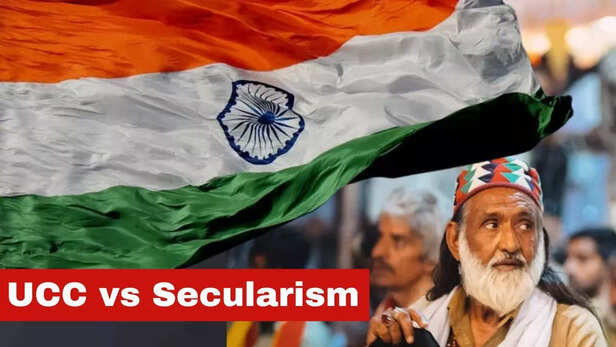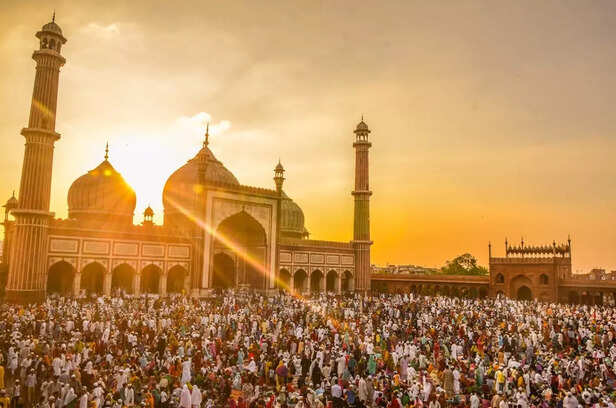UCC vs Secularism: Are Equal Laws Possible in an Unequal Society?
Nidhi | Jun 05, 2025, 15:31 IST
( Image credit : Times Life Bureau, Timeslife )
India’s promise of secularism protects the right to be different — but the push for a Uniform Civil Code asks everyone to follow the same civil rules. This article explores where these two ideals clash. Through real cases like the Shah Bano judgment, the hijab controversy, and new UCC bills, it looks at how law, religion, and identity are colliding in today’s India — and what that means for the future.
When India chose secularism as a constitutional principle, it didn’t mean the exclusion of religion from public life. Rather, it meant equal respect and legal recognition for all religions — including their distinct personal laws. That is why Muslims could follow Shariat in matters of marriage and inheritance, Hindus could observe their customs under the Hindu Code, and Christians and Parsis had their own family laws too.
But in this diverse legal fabric, the Uniform Civil Code (UCC) is a thread of a different color — seeking to replace religious personal laws with one common law for all citizens. Its advocates call it the path to gender justice, legal clarity, and national integration. But when viewed against India’s unique brand of secularism — which protects difference, not sameness — the UCC brings an unavoidable contradiction to the surface.
Below, we explore this contradiction in depth, through legal history, case studies, and community responses — not to argue for or against the UCC, but to understand where it challenges India’s foundational principles.  India’s version of secularism does not require a strict separation of religion and state, as in the West. Instead, it guarantees freedom of religion under Articles 25–28 and permits the state to engage with religion to ensure social justice. This led to the continuation of personal laws after independence:
India’s version of secularism does not require a strict separation of religion and state, as in the West. Instead, it guarantees freedom of religion under Articles 25–28 and permits the state to engage with religion to ensure social justice. This led to the continuation of personal laws after independence:
 The idea of the UCC is to provide a common set of civil laws applicable to all citizens regardless of religion. Supporters argue this would ensure:
The idea of the UCC is to provide a common set of civil laws applicable to all citizens regardless of religion. Supporters argue this would ensure:

In the Shah Bano case, the Supreme Court ruled in favor of a 62-year-old Muslim woman seeking maintenance under Section 125 of the Criminal Procedure Code, which applies uniformly to all citizens. The judgment was based on the principle that no one should be left destitute, regardless of religion. However, it was opposed by sections of the Muslim community on the grounds that it contradicted Islamic law, which limits post-divorce maintenance to a fixed period (iddat).
This led to the enactment of the Muslim Women (Protection of Rights on Divorce) Act, 1986, which allowed maintenance only during the iddat period unless the woman had no other means of support. The episode highlighted the complex intersection between gender justice and religious autonomy.
In Karnataka, Muslim schoolgirls were denied entry for wearing the hijab, citing uniform dress codes in educational institutions. The High Court upheld the ban, stating that the hijab was not an essential religious practice in Islam and that school policies could prioritize discipline and uniformity.
This case raised broader questions about how secular institutions should accommodate religious symbols, and whether restricting them violates constitutional rights under Article 25.
These comparisons reveal inconsistencies in how religious expressions are interpreted across contexts, and whether “uniformity” means equality or erasure of difference.

Many Muslim organizations have raised objections to UCC proposals on the grounds that:
While Hindu law was codified in the 1950s, several sects and communities still follow regional or caste-based customs. Concerns include:
The Indian Constitution places both religious freedom and uniform legal treatment as central values — but applying both simultaneously has proven to be difficult. While secularism protects the right to be different, the Uniform Civil Code seeks to enforce legal sameness in civil matters.
The contradiction does not lie in either principle being unjust — but in their potential to conflict in practice. When one citizen’s equality requires changes to another citizen’s religious practices, the line between reform and interference becomes blurred.
The ongoing debate around the UCC is not simply legal or political — it is a constitutional challenge about how a diverse democracy defines equality.
This is where the conversation becomes most complex: When secular equality and religious freedom both have valid stakes, which value takes precedence? Can they be balanced, or must one always be sacrificed for the other?
Explore the latest trends and tips in Health & Fitness, Travel, Life Hacks, Fashion & Beauty, and Relationships at Times Life!
But in this diverse legal fabric, the Uniform Civil Code (UCC) is a thread of a different color — seeking to replace religious personal laws with one common law for all citizens. Its advocates call it the path to gender justice, legal clarity, and national integration. But when viewed against India’s unique brand of secularism — which protects difference, not sameness — the UCC brings an unavoidable contradiction to the surface.
Below, we explore this contradiction in depth, through legal history, case studies, and community responses — not to argue for or against the UCC, but to understand where it challenges India’s foundational principles.
Secularism and the Personal Law System in India

Indian Flag
( Image credit : Times Life Bureau )
- Hindus were brought under a codified legal structure through the Hindu Code Bills (1955–56).
- Muslims, Christians, Parsis, and other communities retained separate personal laws.
- These laws govern civil matters including marriage, divorce, maintenance, adoption, and succession.
Uniform Civil Code: Key Provisions and Legislative Developments

Uniform Civil Code
( Image credit : Times Life Bureau )
- Gender equality in inheritance and marriage rights
- Elimination of discriminatory practices allowed under religious laws
- Legal uniformity and administrative simplicity
- Equal inheritance rights for sons and daughters
- Ban on polygamy across all religions
- Mandatory registration of marriages and divorces
- Uniform rules on adoption and maintenance
Points of Tension: Where Secularism and UCC Appear to Collide

UCC and Secularism
Shah Bano Case (1985)
This led to the enactment of the Muslim Women (Protection of Rights on Divorce) Act, 1986, which allowed maintenance only during the iddat period unless the woman had no other means of support. The episode highlighted the complex intersection between gender justice and religious autonomy.
Hijab Ban in Karnataka (2022)
This case raised broader questions about how secular institutions should accommodate religious symbols, and whether restricting them violates constitutional rights under Article 25.
These comparisons reveal inconsistencies in how religious expressions are interpreted across contexts, and whether “uniformity” means equality or erasure of difference.
Contradictions for Hindu, Muslim, and Tribal Communities

Jama Masjid
( Image credit : Pexels )
Muslim Concerns
- Islamic law already contains provisions for justice, such as inheritance shares for women and maintenance for divorcees.
- UCC is seen as a majoritarian imposition, overriding centuries-old religious traditions.
- There is a perception of selective targeting, as many of the proposed reforms directly challenge Muslim personal law (e.g., polygamy, inheritance, triple talaq).
Hindu and Tribal Concerns
- Loss of customary practices among tribal communities, such as matrilineal inheritance or local marriage rites.
- Resistance from Ashram-based or sectarian groups that do not follow mainstream Hindu marriage rituals.
- Perceptions that UCC draws from the Hindu legal template, and thus enforces a subtle form of religious dominance under the guise of neutrality.
Coexisting Ideals or Constitutional Crossroads?
The contradiction does not lie in either principle being unjust — but in their potential to conflict in practice. When one citizen’s equality requires changes to another citizen’s religious practices, the line between reform and interference becomes blurred.
The ongoing debate around the UCC is not simply legal or political — it is a constitutional challenge about how a diverse democracy defines equality.
This is where the conversation becomes most complex: When secular equality and religious freedom both have valid stakes, which value takes precedence? Can they be balanced, or must one always be sacrificed for the other?
Explore the latest trends and tips in Health & Fitness, Travel, Life Hacks, Fashion & Beauty, and Relationships at Times Life!
